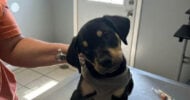I would not recognize her if she crossed before me on the street. I could not pick her out in a staff photo of her and her colleagues. I do not know the color of her hair or skin; I could not even guess if she is short or tall. But her voice—I know her voice. I could recognize that voice anywhere.
I first met Julie sometime before the COVID pandemic, before the shutdown, when the world came to a screeching halt. I had just landed my dream job six months prior, working as a hospitalist in our intensive care unit (ICU) alongside some of the brightest and most dedicated critical care intensivists I now consider friends and brothers. There were times, though, that despite my critical care friends and our litany of specialty backup services, I had to reach out to tertiary care centers. That’s when I met Julie.
I actually never met her. But I met that voice. I met that voice when I once called a tertiary care center seeking to transfer a patient for a higher level of critical care and support beyond the capacity of our local hospital, our regional medical center. Julie is a nurse. But she’s not just any nurse. I’ve never seen her in action. I’ve never cared for mutual patients with her. But I’ve called upon her many times since 2019, a few months before COVID-19 ravaged our world.
Julie is a nurse who works in the medical center’s transfer center. She assists physicians like me in coordinating transfers from outlying hospitals. I do not know her credentials, background, experience, or even her medical knowledge base. But, based upon our multitude of conversations over the years, I sense and suspect that she possesses a wealth of knowledge and experience in caring for ill patients that would rival those of me and my physician colleagues.
When COVID turned our world upside down in March 2020, and for two years thereafter, I called Julie and the likes of Julie daily, sometimes several times daily. I did not always speak to Julie directly. I often spoke with her colleagues. But I also spoke with other transfer center nurses at other tertiary care centers who helped me as well, much like Julie. And when we were brutalized in the ICU, surge after surge, Delta being the worst, I spent many hours of my days calling and talking to Julie and all the other “Julies” out there, seeking help, trying to secure a bed, any bed, trying to find a place who could offer my dying patients a little hope, any hope, as we exhausted all our conceivable measures at our local hospital, our regional medical center.
Sadly, at the time, most hospitals were functioning beyond capacity, as was our regional medical center, and facing the onslaught of nursing and physician burnout. They, like our hospital, had little to no capacity to offer their services, their beds, their support. There simply were not enough of them. But what Julie offered, as did many other “Julies” out there, was a voice, a connection, to someone who listened, who commiserated, who offered what she (or sometimes he) could, if nothing else, but an ear to bend to the voice on the other end of the phone call.
Roughly two years have passed since the official end of the COVID pandemic. And the frequency and urgency of those phone calls to Julie and all the other “Julies” out there now pale in comparison to the days of the pandemic. But every once in a while, I would contact Julie or one of her colleagues, and we’d reconnect and share a story about our families, our professions, and our interests, all the while trying to simultaneously coordinate a transfer. It’s not like we were besties or anything like that, but during those two years, when the world had not a clue about what we experienced, what we dealt with, what we feared, Julie (and all the other Julies) was there if nothing else but to listen to, to offer an ounce of compassion to, a Podunk Hospitalist in Southern Ohio who was struggling to care for his patients, his local brethren, his kinfolk.
***
Like many of my colleagues across the country and even my local hospital, I find myself now a victim of the “restructuring” and “reorganizing” processes that rear their ugly heads in today’s modern health care environment. As such, I no longer work at my local hospital. My services were no longer needed. Rather than commuting one hour to Columbus, I found a new “home,” deeper in Southern Ohio, surrounded by colleagues and friends.
Recently, I was caring for a patient at my new “home” hospital who needed specialty care and services our hospital did not offer. As such, I contacted the transfer center and, to my surprise, Julie answered the call. It had been at least six months, possibly longer, since I last chatted with Julie on the telephone. I immediately recognized her voice. I wasn’t sure she recognized mine. Frankly, I was hoping she wouldn’t. I grew tired of having to explain to friends, colleagues, and even strangers why I no longer work at my hometown hospital.
The transfer process was going well, and I was in stealth mode during the question-and-answer session. But then, Julie asked for my name. My heart sank. I stated my name, and then I began spelling it for her. I didn’t make it past the third letter of my last name when she immediately recognized me, my voice. And then she asked the proverbial, “I thought you worked at xxx?”
“I did work there, but no longer. This is my home now,” I responded. A long pause ensued, and I offered her my story. She listened, offered some heartfelt sentiments, and then wished me the best in my new endeavor. And, just like the days of yore, she then inquired about my children, my family, and our recent travels, and I, of course, inquired about her family and joyous occasions. We continued to laugh, commiserate, and share fond stories between us. During our laughs and memories, Julie helped coordinate a transfer for my patient, once again helping a hospitalist in Southern Ohio care for his local brethren, his kinfolk.
To all the “Julies” out there, but especially to Julie at the transfer center, I thank you for your kindness, assistance, and compassion, especially when we worked and lived in a disaster zone during the pandemic, for lending an ear to a physician struggling to care for his local friends and neighbors.
I thank you.
Zoran Naumovski is a hospitalist.























![AI censorship threatens the lifeline of caregiver support [PODCAST]](https://kevinmd.com/wp-content/uploads/Design-2-190x100.jpg)
